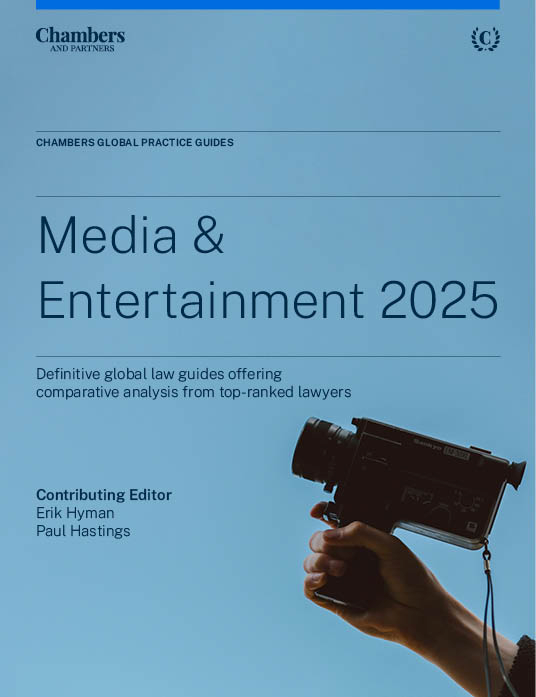
Media & Entertainment 2025
The new Media & Entertainment 2025 guide provides the latest legal information and up-to-date commentary on global trends in the entertainment market, the use of deal structures such as back-end and profit participation models, the role of unions and strikes in the industry, taxes and government grants, IP and AI considerations, and the rise of streaming platforms and the specific challenges and opportunities they offer.
Last Updated: July 23, 2025
Introduction
The global media and entertainment industry entered 2025 in the throes of technological disruption and structural shifts. While creator-driven platforms and live events demonstrate continuous growth, more traditional segments are in retreat, squeezed by evolving consumer behaviours, heightened competition for attention, and compounded aftershocks of pandemic-era volatility and labour strikes.
Film and Television
The filmed entertainment sector is currently undergoing a period of recalibration due to several interconnected challenges. The aftermath of the pandemic, followed by Hollywood’s labour strikes, has set the stage for recession-minded production spending. Content output has declined without obvious concern for regenerating content pipelines. Budgets per project are substantially below pre-pandemic levels, particularly in the United States. Studios are disciplined about what they greenlight and how much they are willing to spend. Recognisable franchises and intellectual property are favoured over originals. At the same time, international productions are gaining global market share. Competitive tax incentives, favourable currency conditions, lower labour costs, and investment in state-of-the-art studio infrastructure fuel this shift away from US productions. Meanwhile, consumers spend more time on their mobile screens, increasingly drawn to user-generated content, which has a direct impact on all sectors of the entertainment industry.
Artificial Intelligence (AI)
Advances in artificial intelligence point to a paradigm shift in the media and entertainment landscape. Generative AI is starting to impact various layers of the value chain – from content development and production to personalisation and distribution. While the potential of AI to accelerate workflows, reduce costs, and expand creative capacity is becoming increasingly clear, its broader legal and commercial implications are murky. Studios and agencies are dipping their toes in making investments in AI start-ups as a hedge against the inevitable use of AI-powered digital replicas, voice synthesis, and generated content. Of course, there are unanswered questions about ownership, consent, and compensation, as well as concerns about decreased demand for labour. Legislation is starting to hatch (the NO FAKES (Nurture Originals, Foster Art, and Keep Entertainment Safe) Act of 2023), and a number of legal disputes related to these issues have been arising. Early signals offer a glimpse of what lies ahead, but we have only just cracked Pandora’s box.
Creator Economy
The creator economy is transforming the way content is produced and monetised on a global scale. Digital-native creators – spanning influencers, streamers, podcasters, and independent media entrepreneurs – are more powerful than ever, and many of them are building fully integrated micro-media enterprises that operate outside recognisable studios or network systems. Platforms such as TikTok, YouTube, Instagram, and Twitch enable creators to directly monetise their audiences through a variety of mechanisms, including advertising, brand partnerships, subscriptions, and tipping. Podcasting, once a niche format, is surging in popularity, expanding audiences and experimenting with new ways of generating revenue. As the creator ecosystem matures, private equity has marched in, making investments in content creators, which leaves many of the zeitgeisty players rich and poised for further growth.
Entertainment Companies
The decline of broadcast and cable is reciprocal to the rise of streaming as the dominant model for content delivery. YouTube and Netflix have become prominent leaders, while platforms such as Hulu, Disney+, Peacock, and Amazon Prime Video also possess considerable market share. Most streaming services can now assert profitability.
Netflix and other subscription-based companies are promoting their ad-supported tiers, a strategic shift aimed at boosting profits and expanding their customer base. Warner Bros. Discovery is splitting its cable networks into a new company, part of a broader industry trend to shift away from the traditional cable model. Earlier this year, Comcast also spun off its cable networks and rebranded as Versant, which now includes channels such as MSNBC, CNBC, USA Network, Oxygen, and E!. Meanwhile, the merger between Skydance and Paramount is navigating a challenging regulatory landscape. Expect private equity to acquire some of the spin-offs to manage the decline of cable assets (shrinking but still generating profits), and be on the lookout for further consolidation and reorganisation as tech companies try to assemble IP libraries and media incumbents confront the long-term viability of their entertainment assets.
Music and Catalogue Acquisitions
The music industry is relatively healthy, particularly in terms of touring and the acquisition of music catalogues and publishing rights. Steady cash flows from streaming royalties and licensing have driven both strategic players and financial investors to pursue catalogue deals across various genres and eras. Obvious targets are the major catalogues from established artists, but emerging catalogues associated with popular streaming hits are also garnering attention. Music rights remain a strong and scalable asset class, as sync licensing, growth in international streaming, and new platforms create ongoing opportunities for rights holders.
Live Entertainment and Sports
Live entertainment and sports are thriving, driven by strong consumer demand across various sectors, including concerts and festivals, comedy, live performances, Broadway, and diverse professional sports (traditional and emerging). Global spending on live music has surged, surpassing pre-pandemic levels, while major sports leagues have generated record attendance from devoted fans and record media rights revenues through robust deal-making.
The NBA signed an 11-year media rights deal worth USD77 billion with Amazon, NBCUniversal, and Disney. All major US sports leagues now allow some form of institutional ownership, including private equity investment. Investor interest in the sector has accelerated. Emerging sports categories, such as Formula One, UFC, and crossover boxing events, are attracting both audiences and private capital. Meanwhile, women’s sports are gaining commercial momentum, with the WNBA drawing record attendance and quadrupling their prior annual media rights revenue.
A major settlement was reached in the House v NCAA lawsuit, resulting in a USD2.8 billion settlement that allows colleges to directly compensate athletes through revenue sharing. This marks a significant shift in college sports, moving towards a pay-for-play model. The sports betting industry is still expanding, with 38 states that have legalised sports betting thus far.
Gaming
The video game industry continues to evolve as developers and publishers manage rising development costs, a more challenging funding environment, and changes in how games are monetised. Companies are placing greater emphasis on proven intellectual property, sequels, and live-service formats that keep players engaged over longer periods. In esports, the initial phase of rapid expansion and speculative capital has given way to a greater focus on long-term financial sustainability and scalable business models.
Gaming remains one of the most global and interconnected sectors in the entertainment industry, blending technology, content, and audience engagement across various platforms. Hit games have become the starting point for blockbuster shows and movies. HBO’s The Last of Us raised the bar for game adaptations and drew record audiences, while the Minecraft movie carried the torch and became a global box office hit, proving that gaming IP can lead a new wave of entertainment.
Conclusion
As 2025 unfolds, the entertainment, media, and technology sectors continue to be defined by both creative opportunities and regulatory uncertainty. Against a backdrop of AI disruption, shifting consumption patterns, and intensifying competition for attention and ad dollars, companies must simultaneously embrace innovation, navigate compliance risks, and adapt to the fluid expectations of global audiences.

